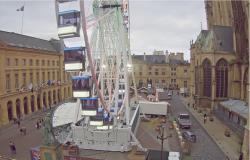
“Nancy we live there”: the brand was officially born this Thursday at the convention center. But why? “Simply because it did not exist,” dared the vice-president of the Greater Nancy Metropolis, François Werner during this presentation.
Imbued with pragmatism, he notes: “It’s more of a signature, a recognition of territory. That said, it would be of no use if it is just supported by institutions. » Indirectly the ball is thus in the court of the present assembly and its speakers coming from the worlds of public, private, entrepreneurship, research or health to bring this new signage to life.
According to speakers, it is obvious: Greater Nancy shines more for its “know-how” than its “know-how”. Who knows that Nancy is the leading engineering training center in France, that there are 130 start-ups via the incubators present in the Metropolis, when the whole of Alsace has 160, that finally the return of nuclear power to France would bring 600 new jobs within 10 years for Fives Nordon based in Nancy? Non-exhaustive list…
A pool of 500,000 inhabitants
Thus, the signature “Nancy we live there” is intended to be more encompassing than the administrative limits of Nancy or even its Metropolis. It is indeed an entity for a territory which integrates intercommunities as the geographer, Martin Vanier, recalled.
“With 20 municipalities and 257,500 inhabitants, you have here the smallest Metropolis at the national level, which must build with its neighbors. Integrating those closest would be politically painful and undoubtedly the least effective path in terms of public policy, but Nancy has an influence that extends into the South of Lorraine, as far as Saint-Dié-des-Vosges, when the North of Lorraine is sucked into Luxembourg. The Nancy attractiveness zone, like an urban area, thus represents 500,000 people. »
“Nancy we live there” is thus the expression of the desire to attract new investors, to sustainably establish talents and businesses, and especially start-ups incubated in the region but developed elsewhere. Because the main reasons identified for these exoduses would be the lack of attractiveness of the Nancy basin, particularly for its land offerings and its transport links. The recent reopening of the Nancy-Lyon railway line is therefore a good sign.
This content is blocked because you have not accepted cookies and other trackers.
By clicking on “I accept”cookies and other trackers will be placed and you will be able to view the contents (more information).
By clicking on “I accept all cookies”you authorize the storage of cookies and other trackers for the storage of your data on our sites and applications for personalization and advertising targeting purposes.
You can withdraw your consent at any time by consulting our data protection policy.
Manage my choices
I accept
I accept all cookies
Further still, the mayor of Nancy and president of Greater Nancy, Mathieu Klein, began to imagine “a possible agreement with the Luxembourg airport in order to open a railway line linking it to Nancy because there is no no greater struggle than accessibility to the territory.” In this great decompartmentalization, the existence of a Lorraine path built not on competition but on the complementarity of Nancy and Metz would also be anything but an economy.





